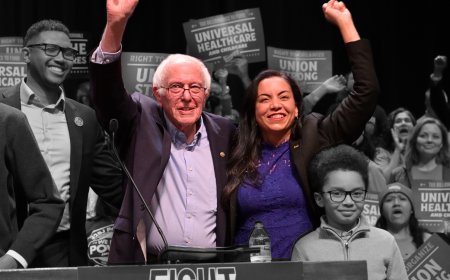Laying Down and Waiting for the Midterms is Not an Option


A curious thing happened after a few brave Democrats walked out in protest during Donald Trump’s abusive and lie-filled State of the Union address. Rather than applaud them for their courage, House Minority Leader Hakeem Jeffries brought them in for a scolding instead. As one source told Axios, “It’s a consultative process. We understand the pressure they are under.”
“They are not being talked to like they are children. We are helping them understand why their strategy is a bad idea.”
While we don’t know what Jeffries’ team said the right strategy is, it’s not hard to surmise. It likely went something like this: “We know you are under pressure from those annoying left activists who cost us the election to look like you are doing something. But the right play is to look dignified and respectful, promise to work with Republicans in a bipartisan way when we can, focus on kitchen table economics like our polling says, let the Republicans make mistakes, turn on each other, blame for the present chaos and upcoming recession. Then win the midterms.”
This is similar to James Carville’s telling Democrats to “lay down and play dead” against Trump and the strategy that appears to guide Democrats in their conciliatory approach to upcoming budget negotiations.
Unfortunately, this is strategically inept and a moral abdication. There are a few key reasons why:
First, unless there is fierce resistance to Trump’s agenda, there may not be free and fair elections to contest in the midterms. Political scientists overwhelmingly agree that the best antibody against authoritarian takeovers is the rapid mobilization of those committed to democracy. Whether recently in South Korea, Poland, Ukraine, or elsewhere, resistance to tyranny cannot come from disenchanted civil society alone. It must also come from elected leaders, or the public and the media will not believe a crisis exists. The failure of elected leaders to treat Adolf Hitler as seriously as he deserved, of course, doomed the Weimar Republic.
Trump and Elon Musk have tried to curtail democracy and the Constitution in just a couple of short months. They will push the boundaries they can. Absent major resistance, they will use almost any excuse they can to make it illegal for Democrats to organize electorally. It’s not paranoia to fear martial law or emergency powers short of it to delay, cancel, or interfere with midterm elections. They will try to alter the media landscape so radically that even if elections take place, they will more resemble those in authoritarian nations with state-controlled media.
Second, it’s not just left activists: base Democrats want to see more fight from elected leaders. No one seems angrier at Democratic leaders than Democratic voters. Congressional Democrats are astonishingly unpopular. One recent Quinnipiac poll showed that 68 percent of voters disapprove of Democrats in Congress, including an astonishingly low 40 percent approval rating from members of their party.
It has become an article of faith among centrist Democrats that left progressives are the cause of their electoral woes. This is highly contestable given that the principal cause of Trump’s 2024 victory appears to have been low Democratic turnout: 19 million voters who chose Biden in 2020 stayed home. Even if you agree with centrists like Matt Yglesias, who argue that Kamala Harris shifted too far left in the 2020 primary—that the liberal intelligentsia’s social stances alienated them from non-college voters, and that the voters who stayed home over leftist frustrations with Biden’s policies would have cost more votes to placate than could be won—it does not follow that the normie resistance liberals who want to see fiercer opposition to Trump are also electoral poison.
Democratic base anger with elected Democrats is so intense that it could damage party unity and turnout. There are likely primary challenges against many incumbents not along traditional progressive versus moderate lines but based on whether the incumbent took the descent into American fascism lying down.
Third, Democrats cannot outsource the resistance to allies. In the Democratic response to Trump’s address, Senator Elissa Slotkin urged Americans to self-organize their resistance without indicating how Democrats would fight. This is political grand negligence.
To its base, the Democratic Party has become an organization that relentlessly texts and emails its most loyal voters for money like a pesky swarm of mosquitoes only to fund ads using inauthentic poll-tested messages. Those expensive media buys do little to counter the ocean of conservative messaging that dominates the baseline media environment.
This is a desiccated vision of what a political party can and should be in the 21st century. Democrats should become a truly civic organization as in the bygone era of patronage politics—except without that era’s corruption.
When voters feel civil society is fraying and no one is looking out for the ordinary person, the Democratic Party can offer real community benefits to voters and make them rethink what the party can be, especially in places where the Democratic brand has become toxic. Tax preparation assistance, childcare, and bureaucracy navigation are things the Democratic Party could offer locally, especially when no elections are immediately approaching. Groups shouldn’t be the ones spontaneously organizing protests at Tesla dealerships: the Democratic Party should be there as a civic organization showing scared and upset voters that it is prepared to fight Musk where it can hurt him the most.
Democratic leadership must put themselves at the forefront of the fight. Waiting for Trump to fail, raising money for midterms, and letting other groups resist totalitarian rule is not wise or responsible. If Democratic leaders don’t want to do the necessary work, new leaders should be found who will.














































